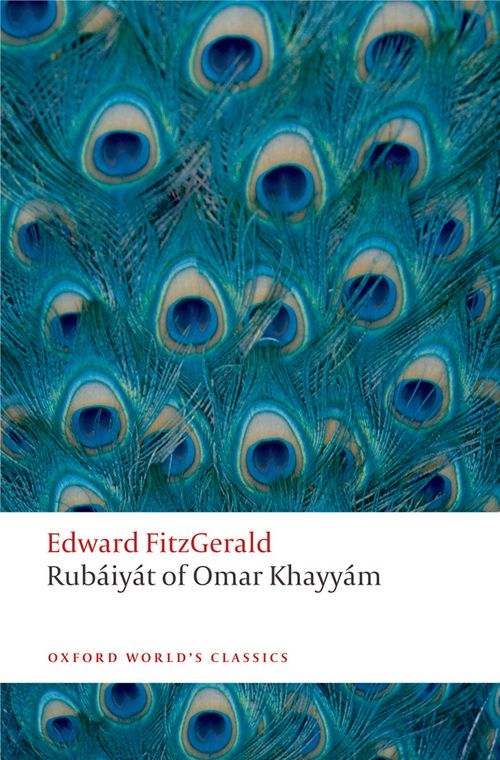Home >
Oxford World's Classics >
Rubaiyat of Omar Khayyam (American Literature)
Oxford World's Classics: American Literature | American Literature
Rubaiyat of Omar Khayyam
ISBN: 9780199580507
Series: Oxford World's Classics: アメリカ文学
Rubaiyat of Omar Khayyam (American Literature)
Oxford World's Classics: アメリカ文学 Rubaiyat of Omar Khayyam (American Literature) メディア > 書籍 > ノンフィクション > 言語学習書 Expect Delays of Up to 4 Weeks| ご注文はこちら |
ISBN
9780199580507 (旧規格ISBN: 0199580502)
- 説明
- シリーズの説明
作家名:フィッツジェラルド
放題:ルバイヤート、ほか
'The Moving Finger writes; and, having writ Moves on: nor all thy Piety nor Wit Shall lure it back to cancel half a line Nor all thy tears wash out a word of it.' In the 'rubaiyat' (short epigrammatic poems) of the medieval Persian poet, mathematician, and philosopher Omar Khayyam, Edward FitzGerald saw an unflinching challenge to the illusions and consolations of mankind in every age. His version of Omar is neither a translation nor an independent poem; sceptical of divine providence and insistent on the pleasure of the passing moment, its 'Orientalism' offers FitzGerald a powerful and distinctive voice, in whose accents a whole Victorian generation comes to life. Although the poem's vision is bleak, it is conveyed in some of the most beautiful and haunting images in English poetry - and some of the sharpest- edged. The poem sold no copies at all on its first appearance in 1859, yet when it was 'discovered' two years later its first admirers included Dante Gabriel Rossetti, Swinburne, and Ruskin. Daniel Karlin's richly annotated edition does justice to the scope and complexity of FitzGerald's lyrical meditation on 'human death and fate'.
放題:ルバイヤート、ほか
'The Moving Finger writes; and, having writ Moves on: nor all thy Piety nor Wit Shall lure it back to cancel half a line Nor all thy tears wash out a word of it.' In the 'rubaiyat' (short epigrammatic poems) of the medieval Persian poet, mathematician, and philosopher Omar Khayyam, Edward FitzGerald saw an unflinching challenge to the illusions and consolations of mankind in every age. His version of Omar is neither a translation nor an independent poem; sceptical of divine providence and insistent on the pleasure of the passing moment, its 'Orientalism' offers FitzGerald a powerful and distinctive voice, in whose accents a whole Victorian generation comes to life. Although the poem's vision is bleak, it is conveyed in some of the most beautiful and haunting images in English poetry - and some of the sharpest- edged. The poem sold no copies at all on its first appearance in 1859, yet when it was 'discovered' two years later its first admirers included Dante Gabriel Rossetti, Swinburne, and Ruskin. Daniel Karlin's richly annotated edition does justice to the scope and complexity of FitzGerald's lyrical meditation on 'human death and fate'.
Oxford World’s Classics は、誰もが知る有名な物語から一般読者にはなじみの薄い隠れた名作まで、古典や文芸作品の数々を100年以上に渡り提供し続けているオックスフォード大学出版局を代表する叢書です。 現在メソポタミア神話から20世紀小説の名著まで、約770タイトルを刊行しており、各作品に相応しい専門家を校訂者に迎え、原典に解題、注釈、年代記、関係書目を付して紹介しています。必要に応じ、地図や用語集、索引、図版等の付録をつけているほか、読者に最新の研究動向を踏まえた作品理解を促すべく、定期的な新刊の追加や、既刊タイトルの改版を行っています。
(注意:本書は、原文を掲載した書籍です。グレイデッド・リーダーではありません)
作家名:フィッツジェラルド
放題:ルバイヤート、ほか
'The Moving Finger writes; and, having writ Moves on: nor all thy Piety nor Wit Shall lure it back to cancel half a line Nor all thy tears wash out a word of it.' In the 'rubaiyat' (short epigrammatic poems) of the medieval Persian poet, mathematician, and philosopher Omar Khayyam, Edward FitzGerald saw an unflinching challenge to the illusions and consolations of mankind in every age. His version of Omar is neither a translation nor an independent poem; sceptical of divine providence and insistent on the pleasure of the passing moment, its 'Orientalism' offers FitzGerald a powerful and distinctive voice, in whose accents a whole Victorian generation comes to life. Although the poem's vision is bleak, it is conveyed in some of the most beautiful and haunting images in English poetry - and some of the sharpest- edged. The poem sold no copies at all on its first appearance in 1859, yet when it was 'discovered' two years later its first admirers included Dante Gabriel Rossetti, Swinburne, and Ruskin. Daniel Karlin's richly annotated edition does justice to the scope and complexity of FitzGerald's lyrical meditation on 'human death and fate'.
放題:ルバイヤート、ほか
'The Moving Finger writes; and, having writ Moves on: nor all thy Piety nor Wit Shall lure it back to cancel half a line Nor all thy tears wash out a word of it.' In the 'rubaiyat' (short epigrammatic poems) of the medieval Persian poet, mathematician, and philosopher Omar Khayyam, Edward FitzGerald saw an unflinching challenge to the illusions and consolations of mankind in every age. His version of Omar is neither a translation nor an independent poem; sceptical of divine providence and insistent on the pleasure of the passing moment, its 'Orientalism' offers FitzGerald a powerful and distinctive voice, in whose accents a whole Victorian generation comes to life. Although the poem's vision is bleak, it is conveyed in some of the most beautiful and haunting images in English poetry - and some of the sharpest- edged. The poem sold no copies at all on its first appearance in 1859, yet when it was 'discovered' two years later its first admirers included Dante Gabriel Rossetti, Swinburne, and Ruskin. Daniel Karlin's richly annotated edition does justice to the scope and complexity of FitzGerald's lyrical meditation on 'human death and fate'.
シリーズの説明
Oxford World’s Classics は、誰もが知る有名な物語から一般読者にはなじみの薄い隠れた名作まで、古典や文芸作品の数々を100年以上に渡り提供し続けているオックスフォード大学出版局を代表する叢書です。 現在メソポタミア神話から20世紀小説の名著まで、約770タイトルを刊行しており、各作品に相応しい専門家を校訂者に迎え、原典に解題、注釈、年代記、関係書目を付して紹介しています。必要に応じ、地図や用語集、索引、図版等の付録をつけているほか、読者に最新の研究動向を踏まえた作品理解を促すべく、定期的な新刊の追加や、既刊タイトルの改版を行っています。
(注意:本書は、原文を掲載した書籍です。グレイデッド・リーダーではありません)
EASY ORDER FORM
表示価格が税込価格
価格(税抜):
1,740 円


